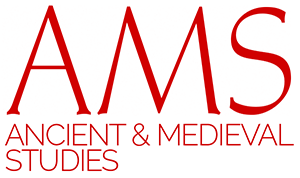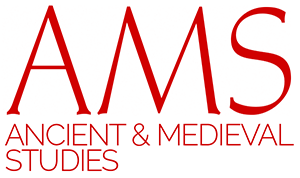Through a wide variety of subjects drawn from a number of disciplines, this program provides a curricular framework for exploring topics in ancient and medieval studies which range from the history of ideas and institutions to that of material artifacts, literature and certain of the original languages. The chronological span of the program includes some 6,500 years between 5000 B.C. and 1500 A.D.
The goal of this program is to develop knowledge and understanding of the more distant past both for itself, in its uniqueness, and as an object of specifically modern questions and methods of inquiry. We are interested in the structure of institutions and social systems, and in relationships between the social order and learned traditions, values, ideologies and ideas. Ancient and medieval studies derive a special claim to our interest from the fact that the record is so full and multiform and that much of it is of exceptionally high quality at once in substance and form.
The Minor Program in Ancient and Medieval Studies is designed for students who, in addition to the focus of their major program of study, are seeking a fuller understanding of the forces which shaped the ancient and medieval world. The geographical and chronological scope of the Minor program is broadly conceived and is intended to be comparative. Subjects range in content from Classical Greece and Rome, and the ancient societies of Asia and South America, to medieval Europe and Japan. Students will be required to demonstrate intermediate level language proficiency in either Greek, Latin or a medieval vernacular, but they need not concentrate their other subjects on the area associated with that language. Students are also expected to have some distribution across the ancient and medieval time periods. We expect that students will consult closely with the Minor Advisor in order to devise a coherent program of study.
The Minor program in Ancient and Medieval Studies consists of six subjects (at least three of which must be taken at MIT) including two language subjects in Area I (or equivalent proficiency) and four remaining subjects selected from at least two of the three disciplinary areas II-IV.
Area I: Language
Area II: Humanities and the Arts
Area III: Social Sciences
Area IV: Historical Studies
Upon consultation with the Minor Advisor, one subject from Area V (Methodology) could also be included in the six required subjects.
As with all HASS Minors, only five of the six minor subjects may be counted toward the 8-subject Institute HASS Requirement. Of these five, at most one (1) shall count toward satisfaction of the HASS-Distribution Requirement.*
AREA I: LANGUAGE
Level III and IV French, Spanish or German
Equivalent level of Greek, Latin, Italian, Norse, or Arabic [for those proposing a specialty in the medieval Islamic world] taken off campus. Students with the equivalent proficiency (but who are not native speakers), can either take two advanced language subjects, or another two courses from the rest of the program.
AREA II: HUMANITIES AND ARTS
4.609 Seminar in the History of Art and Architecture (when applicable) ‡
4.614 Religious Architecture and Islamic Cultures HASS-A
4.635 Renaissance Architecture HASS-A
21L.001 Foundations of Western Culture: Homer to Dante HASS-H, CI-H
21L.455 Classical Literature HASS-H
21L.458 The Bible HASS-H
21L.460 Medieval Literature HASS-H
21L.704 Studies in Poetry (when applicable) HASS-H‡
21M.220 Medieval and Renaissance Music HASS-A
24.410 Topics in the History of Philosophy (when applicable) (G)
AREA III: SOCIAL SCIENCES AND MATERIAL SCIENCES
3.982 The Ancient Andean World HASS-S
3.983 Ancient Mesoamerican Civilization HASS-S
3.993 Archaeology of the Middle East HASS-S
4.444 Analysis of Historic Structures
AREA IV: HISTORICAL STUDIES
ANCIENT
21H.007J Empire: Introduction to Ancient and Medieval Studies HASS-H, CI-H [21L.014J]
21H.130 The Ancient World: Greece HASS-H, CI-H
21H.132 The Ancient World: Rome HASS-H, CI-H
21H.236 The Making of a Roman Emperor HASS-H
21H.237 The City of Athens in the Age of Pericles HASS-H, HASS-E
21H.239 The City of Rome in the Age of the Caesars HASS-H, HASS-E
21H.406 Julius Caesar and the Fall of the Roman Republic HASS-H, HASS-E, CI-M
MEDIEVAL
21H.134J Medieval Economic History in Comparative Perspective [14.70J] HASS-S, CI-H
21H.133 The Medieval World, 200-1500 HASS-H, HASS-E
21H.238 The Vikings HASS-H, HASS-E
AREA V: METHODOLOGY
3.990 Seminar in Archaeological Method and Theory ‡
21H.390 Seminar in Historical Methods HASS-H, HASS-E
Students that have taken the following subjects that are no longer offered can count these subjects toward their minor:
21A.110 Seminar in Anthropological Theory
21A.211 Magic, Witchcraft, and the Spirit World
21H.411 History of Western Thought, 500-1300
21H.521 Ancient Japan and the Courtly Society
21H.522 Japan in the Age of the Samurai: History and Film
24.200 Ancient Philosophy
[ ] Jointly listed subjects
‡ Subject offered on a variable schedule, please check with department
(G) Graduate subjects which are open to qualified undergraduates, with the permission of the instructor
Additional information can be obtained from:
Prof. Eric Goldberg, Room E51-290, (617) 324-2420, egoldber@mit.edu or Prof. Stephanie Frampton, Room 14N-434, (617)253-4452, sframpto@mit.edu



